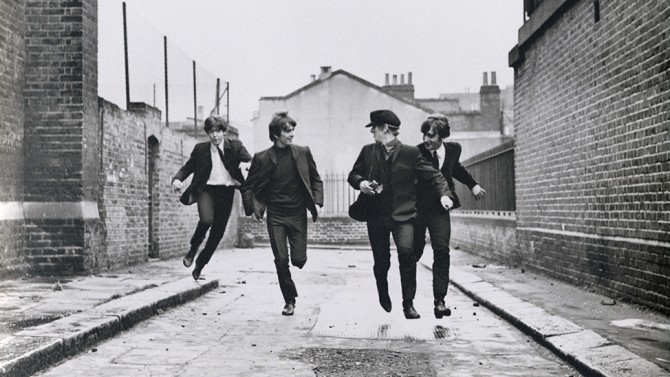
Richard Lester’s noisy, jumpy, compulsively ironic A Hard Day’s Night has played an important part in the Fab Four’s creation myth since its London premiere on July 6, 1964. Like the Beatles themselves, the film is strangely resistant to negative criticism. It has never really gone out of fashion, which is partly why Indie Memphis is screening a great-looking 50th anniversary restoration on Wednesday, July 9th, at Studio on the Square.
This meticulously scripted yet seemingly improvised piece of fanboy and fangirl propaganda seduced critics immediately. The Village Voice‘s Andrew Sarris proclaimed that “A Hard Day’s Night has turned out to be the Citizen Kane of jukebox musicals, the brilliant crystallization of such diverse cultural particles as the pop movie, rock n’ roll, cinéma vérité, the nouvelle vague, free cinema, the affectedly hand-held camera, frenzied cutting, the cult of the sexless subadolescent, the semidocumentary, and studied spontaneity.”
In enthusiastic prose that suggests Sarris was momentarily infected by the same hysteria propelling Night‘s hordes of screaming teenage girls, Sarris also wrote, “My critical theories and preconceptions are all shook up, and I am profoundly grateful to the Beatles for such a pleasurable softening of hardening aesthetic arteries.”
Nearly 40 years later, Roger Ebert’s “Great Movies” essay echoed Sarris’ sentiments while highlighting the film’s continuing influence on pop-culture consumption. “Today,” he wrote, “when we watch TV and see quick cutting, hand-held cameras, interviews conducted on the run with moving targets, quickly intercut snatches of dialogue, music under documentary action and all the other trademarks of the modern style, we are looking at the children of A Hard Day’s Night.” Although countless reality shows and endless infotainment programming have rendered the expressive possibilities of Lester’s sound-image syntheses commonplace clichés, it’s hard to argue with Ebert’s assessment.
Along with Rob Reiner’s This is Spinal Tap, A Hard Day’s Night is the definitive movie about being in a rock-and-roll band — which doesn’t necessarily make it truthful or authentic. In a new essay for the Criterion Collection’s DVD release, Howard Hampton praises the film as a truthful-looking act of calculated image manipulation: “Collective and individual identities — the John-Paul-George-Ringo lunch box and merchandise concession — are worked out and woven through a treadmill environment where the hamsters play satiric havoc with the business of light entertainment and teen merchandising.” However, no amount of cynicism or satire can deflate the first “Can’t Buy Me Love” interlude, where the Beatles jump, scuffle, dance, and collide with each other in an open field like overheated molecules.
Disharmonious voices about the film were seldom heard. They did exist, though; in his 1966 essay “Day of The Lesteroids,” Manny Farber wrote “Lester’s trademark is a kind of thickness of texture which he gets purely with technique, like the blurred, flattened, anonymous, engineering sounds which replace actors’ voices, plus the piling up of finicky details, as in the scene of the Beatle shaving his friend’s image in the mirror.” And remember the guy who once sang “I don’t believe in Beatles,” too. But I don’t want them to spoil the party.
A Hard Day’s Night screens at Malco’s Studio on the Square Wednesday, July 9th, at 7 p.m. and 9 p.m. Tickets are $8.